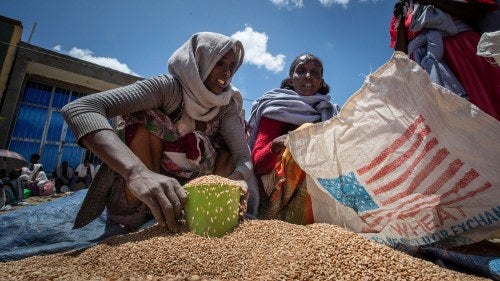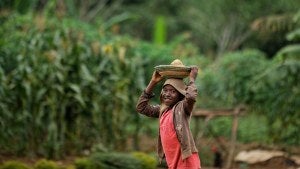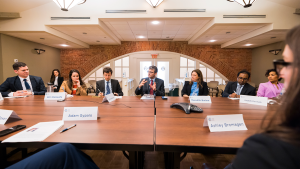Broken Trust, Investing in America, and Toxic Water
Check out our roundup of the week's top news and research in food, agriculture, and global development.

Top Story
A Hunger-Free World Is Becoming Increasingly Out of Reach
An estimated 735 million people around the world went hungry in 2022, a number much higher than in years prior to the COVID-19 pandemic, threatening progress toward achieving zero hunger by 2030. Instead, a projected 600 million people will still be undernourished. To change this trend, countries need to embrace localized solutions.
Council Insights
Storming the Barricades
In the final episode of our limited podcast series Youth in Agriculture: Transforming Local Food Systems, student Promise Adesokan and GAIN Executive Director Lawrence Haddad discuss different ways young people are “storming the barricades” to get involved in global food and agriculture. Listen in or read the transcript on our website.
 Food and Agriculture
Food and Agriculture
Food and Agriculture
Broken Trust
In Uganda, HRW reports France’s TotalEnergies oil pipeline plans have displaced families. Farmers’ uncertainty over their right to harvest land intended for the pipeline prior to its construction has led to immense financial loss and food insecurity for thousands of farmers.
Feijoo's Water Plan
Spain’s People’s Party leader Feijoo is campaigning on a water management promise of $47.86 billion, highlighting the pressing issues of drought, climate change effects, and the legalization of irrigation for berry farmers near Donana wetlands.
Another Go for Glyphosate?
The EU will vote on EFSA’s reapproval of glyphosate in herbicides and fertilizers. Questions of missing data in the EFSA review and pro-industry motives adds to criticisms of the chemical that began in 2015 when WHO claimed glyphosate was likely carcinogenic, costing Monsanto billions in lawsuits.
Deeper Dive
An Environmental Election
Rural landscapes, renewable energy, and irrigation are dominating Spain’s election. Prime Minister Sanchez is promising residents decision-making power for solar and wind park locations. The opposing People’s Party campaign is prioritizing water infrastructure for farming irrigation over renewable energy as the country faces an ongoing drought.
Resilience
Waste Not
Malawi is taking a unique approach to rising fertilizer prices; it is replacing chemical fertilizer with organic fertilizer through converting organic waste. The approach will enable the restoration of soils, improve agricultural yields, and reduce solid waste pollution.
DC Report
Investing in America
USDA plans to establish a network for monitoring greenhouse gas emissions and measuring carbon capture in farming practices, using $300 million in funding from the Inflation Reduction Act. The network will provide data on the outcomes of climate-smart and regenerative agricultural practices.
Big Actors
Toxic Water
Japanese officials fear they may lose their biggest seafood buyer, China, over concerns of water safety following Tokyo's decision to discharge treated radioactive water from the Fukushima plant into the sea. China’s customs announced stronger bans and initiated product surveillance in non-banned regions, citing disagreement among IAEA officials on the water’s safety.
Big Ideas
A Sustainable Future
Agriculture and the food ecosystem contribute significantly to global greenhouse gas emissions, but new technology is enabling farmers and major food companies to make agriculture cleaner. Regrow Ag, for example, uses satellite imagery, weather data, and on-the-ground observations to create a computer model that helps inform farmers and the public sector about sustainable agricultural practices.
Ask an Expert
What are you looking forward to as a nonresident fellow?
"I am absolutely thrilled to be joining an esteemed team of brilliant minds, distinguished leaders, and trailblazing achievers at the Council. The anticipation of the vast knowledge awaiting me on this transformative journey is exhilarating. I am very excited that I have stepped onto this grand international stage, where I can proudly unveil my work, showcase my skills, and flourish into the accomplished policy maker I have always aspired to be.”
— Nonresident Fellow Jones Kanjira


Have a question about food and agriculture? Ask one of our experts at the Center on Global Food and Agriculture to get an answer in next week's Global Food for Thought!
Council Events
Did you miss one of our previous livestreams? Don't worry! They are all available on our website to watch at any time.
Other Upcoming Events
Soul Fire Farm Community Work and Learn
Date: July 18
Time: 10:00 – 3:30 p.m. ET
Irregular Migration and Food Security: A View from West Africa
Date: July 20
Time: 9:30 – 10:00 a.m. ET
Urban Growers Collective Seedling Sale
Date: July 22
Time: 9:00 – 4:00 p.m. CT
2023 UN Food Systems Stocktaking Moment
Date: July 24 – 26
Michael Fields Agricultural Institute Emerging Crops for Soil Health – Field Day
Date: August 9
Time: 10:00 – 1:30 p.m. CT
Land Acknowledgement Statement
The Center on Global Food and Agriculture recognizes it occupies the ancestral land of the Kiikaapoi, Peoria, Kaskaskia, Bodwéwadmi, and Myaamia people. Indigenous communities around the world disproportionately experience the pressures of climate change, global conflicts, and the COVID-19 pandemic, while simultaneously stewarding 80 percent of the world’s biodiversity. These Indigenous tribes and nations are the original owners of this land and continue to be systemically erased by policies and practices that ignore their histories. To learn more about Indigenous foodways and practices, check out our 2022 blog series "Stewardship, Sovereignty, and Solutions."
Related Content
- Embracing Dandelions as Food and Medicine
- Going Beyond Regenerative Agriculture on Tribal Lands
- Expanding "638" to Enhance Native American Food Sovereignty
- Flavors and Culture: Food Systems Through Indigenous Women's Eyes
- A Thanksgiving Legacy: Fighting for Indigenous Food Sovereignty
- Native Food Sovereignty: Strengthening Connection to Culture
- Reconnecting to Indigenous Food Sovereignty Values and Practices
- Embracing Interconnectedness: How Indigenous Foodways Can Save Us






